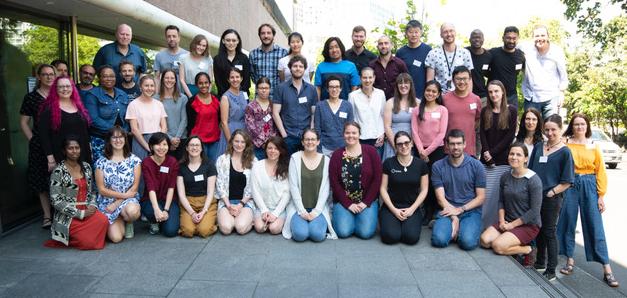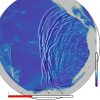A partnership approach to building skills in New Zealand's genomics research sector
The Challenge:
Addressing New Zealand researchers' skills gaps in scripting and workflow management, as well as access gaps to high performance computers (HPCs) and data sharing tools.The Solution:
NeSI and Genomics Aotearoa adopting a national partnership approach to spearhead and support a national genomics-focused training effort.The Outcome:
Highly-relevant genomics skills training that facilitates capability growth among New Zealand researchers.
As data generation becomes easier, researchers are under more and more pressure to clean, process, and understand enormous amounts of information. High-quality research outcomes, then, are increasingly dependent on researchers developing skills in managing and processing data.
There is an expectation, for instance, that researchers in the genomics sector have some knowledge in scripting and workflow management, access to high performance computers (HPCs,) data sharing tools, and more, even if such topics were never covered in high school or university courses. With no clear path for developing domain-specific capability, many genomics researchers are eager to build their skills by attending workshops and training events.
NeSI and Genomics Aotearoa (GA) acknowledge this demand for genomics and bioinformatics training among New Zealand’s researchers and, as national providers, are well-placed to support their upskilling:
NeSI, with its specialised infrastructure, support staff, and computational science expertise, is 'the power behind researchers'. NeSI has a strategic commitment to help drive New Zealand research forward, and building researchers' digital skills through training is one way of doing so.
Genomics Aotearoa, as a collaborative platform of nine partnering institutions and over 30 affiliates, has deep domain knowledge and can sense where the field of genomics is headed. GA has brilliant researchers and, like NeSI, a strategic commitment to increase the capability of its researchers and genomics researchers throughout New Zealand.
Together, NeSI and Genomics Aotearoa have the domain knowledge, technical skills, and motivation to address the skills gap facing New Zealand’s genomics and bioinformatics sector, which is why the two joined forces in 2018 to, among many things, offer genomics training across New Zealand.
As a first step, in early 2019 NeSI and Genomics Aotearoa hired new training leads, Megan Guidry (NeSI) and Ngoni Faya (Genomics Aotearoa), to collaborate on spearheading a national genomics-focused training effort.
With both Genomics Aotearoa and NeSI having a dedicated training lead, the partnership approach to training quickly took off. Genomics Aotearoa and affiliates provided instruction and coordinated workshop logistics, while NeSI supplied the HPC platform, provisioning support, and course/workshop helpers. These targeted efforts resulted in a successful first year of training impact. In 2019, Genomics Aotearoa and NeSI delivered 10 workshops over six months in places like Dunedin, Christchurch, Wellington, Palmerston North, and Auckland, reaching 217 participants.
Meanwhile, NeSI and Genomics Aotearoa have also been working to optimise learning for those attending short (typically two-day) workshops, appreciating the need for follow up and further support for the training to be as effective as possible. To address this, NeSI runs online hacky hours for genomics researchers using NeSI platforms and coordinates two Carpentries instructor training sessions per year on behalf of the broader research sector.
The Carpentries project comprises the Software Carpentry, Data Carpentry, and Library Carpentry communities who share a mission to teach foundational computational and data management skills to researchers. The Carpentries value sound pedagogy and empathetic instructing methods, and have developed a training course for Carpentries instructors to learn how to teach effectively.
“Instructor training helped me to better understand the mental models of teaching and look at knowledge transfer from a different angle,” says Florian Pichlmuller, a Genomics Aotearoa researcher and certified Carpentries instructor. “Having participated in different kinds of workshops and courses, the Carpentries are certainly one of the most practical and hands-on I know. As an instructor, I also gained valuable experience in how to organize such workshops, present course material and explain bioinformatics to an often novice audience.”
By offering New Zealand researchers the chance to attend Carpentries instructor training sessions, NeSI and Genomics Aotearoa strive to encourage a grassroots effort towards improving knowledge transfer within local research communities. By using their training resources wisely, NeSI and Genomics Aotearoa are empowering and incentivising local researchers to pass on their knowledge; this is a big part of their broader mission to upskill the New Zealand research sector.
It simply would not be possible for NeSI and Genomics Aotearoa to run as many workshops as they have without the dedicated efforts of volunteers like Florian who understand how valuable training opportunities are to researchers.
Other people invaluable to the delivery of these workshops include:
NeSI's Applications Support Team — with a special mention of Dinindu Senanayake, who also helped teach at many of the workshops, ensuring all 217 attendees had proper access to NeSI's HPC platforms.
The numerous volunteers from the research community who spent hours prepping, teaching, and debriefing.
The workshop organizers who scheduled, planned, and advertised each event, often remotely.
The broader Genomics Aotearoa and NeSI teams for creating an environment where NeSI and GA’s shared training vision could come to fruition.
NeSI and Genomics Aotearoa would not be celebrating a successful year of genomics training without the many dedicated people mentioned above (and surely more!). Delivering genomics training has been, and will continue to be a collaborative effort, and NeSI and Genomics Aotearoa look forward to generating more learning and capability-building opportunities for genomic researchers in NZ in 2020 and beyond.







